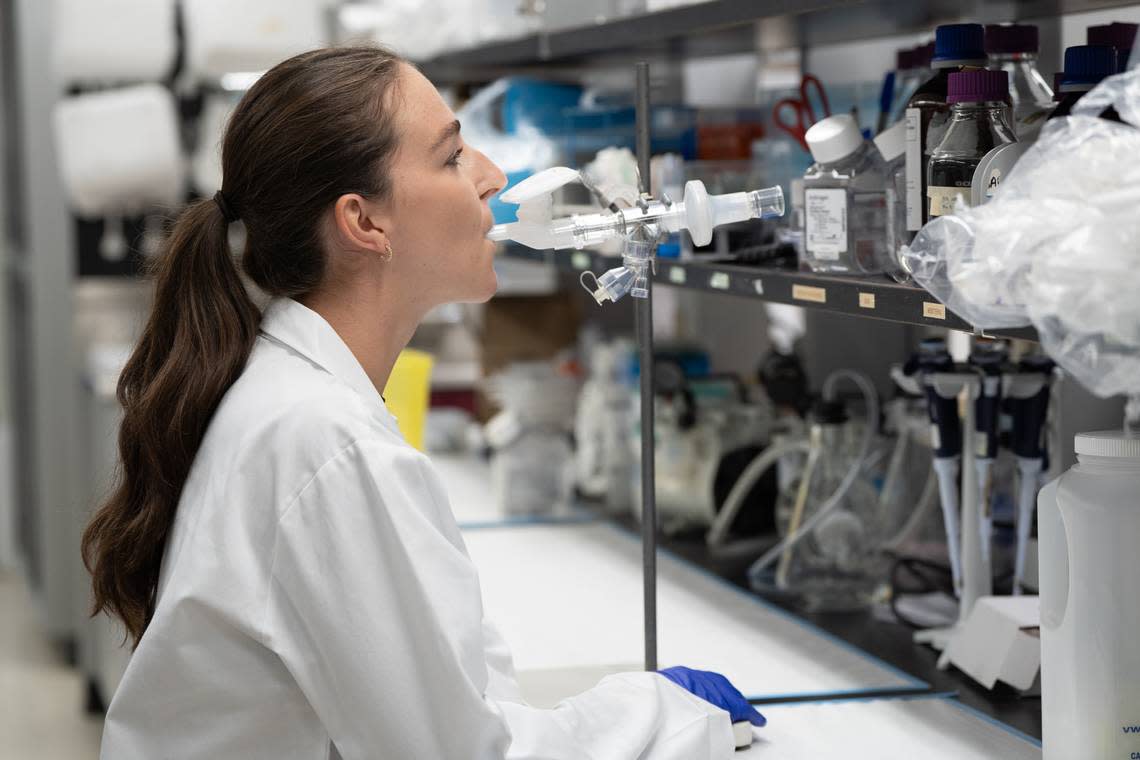‘No-needle’ COVID vaccine may protect you better, researchers say. How does it work?
Could a “no-needle” COVID-19 vaccine protect against the virus better than traditional shots?
A new inhaled COVID-19 vaccine created in Canada is “far more effective” at kickstarting the body’s “protective” immune response than shots, according to researchers at McMaster University in Ontario. This is based on the results of published, pre-clinical trials, which have paved the way for the vaccine to be studied in people.
With the first phase of studies in people underway, the researchers have now received over $8 million in funding to support a larger Phase 2 study involving up to 500 people in the coming months, the university announced in a Jan. 20 news release. The funding comes from the Canadian Institutes for Health Research.
Given COVID-19’s ability to evolve, researchers say their vaccine has the potential to protect against omicron and other variants that emerge.
“The current vaccination strategy for COVID-19 has us constantly chasing the virus, and it’s clear that we simply can’t keep up,” Dr. Matthew Miller, who is helping lead the studies and is a professor of biochemistry and biomedical sciences, said in a statement.
“Our team has developed a vaccine strategy aimed at circumventing this cycle and the need to constantly update these vaccines by targeting parts of the virus that are resistant to mutation, and inducing strong immunity at the site where infection actually occurs,” Miller added.
To date, there is no authorized alternative to COVID-19 vaccines involving injections in the U.S. Nearly 70% of the population has been vaccinated with two doses and roughly 15% of the population has received the latest updated booster dose, according to the Centers for Disease Control and Prevention.
The Canadian researchers hope that their needleless, “pain-free” vaccine will encourage people to get vaccinated, the release said.
How does the inhaled COVID vaccine work?

The inhaled COVID vaccine is administered through a nebulizer, a device that transforms liquid into an inhalable mist, according to McMaster University. Its design is based on decades of university research on an inhaled tuberculosis vaccine.
“The (COVID-19) vaccine starts in liquid form and is loaded in a device that turns it into an aerosolized mist,” Miller explained in a November news release. “The person who’s being vaccinated simply breathes in this mist and it gets deposited in their lungs.”
This method may be better at protecting against COVID-19 than available COVID-19 shots because it directly reaches the lungs and the upper respiratory system where “viruses first enter the body,” according to researchers.
Their pre-clinical trials published in the peer-reviewed journal Cell in February demonstrated this. The work involved studying the vaccine’s effect on mice and revealed the vaccine can effectively induce immunity against current COVID-19 variants and future variants.
“We knew that COVID would change,” Dr. Brian Lichty, who is also involved in developing the vaccine, said in a statement in November. “We designed our vaccine to anticipate those changes, by including portions of the virus that won’t change, and including portions that are conserved amongst other coronaviruses so that maybe it gives some level of protection against future possible pandemic coronaviruses that don’t even exist yet in the human population.”
Inhaled vaccine studies in people
Now, as a result of the pre-clinical trials, the inhaled vaccine is being studied in 30 people who previously received at least two mRNA vaccine doses, according to the university. The purpose of this Phase 1 study is to assess the vaccine’s safety and the dosages.
There is no definitive time when the Phase 1 trials will end, university spokeswoman Michelle Donovan told McClatchy News on Jan. 20.
When it does end, Phase 2 will begin not long after and within the upcoming months, according to the release. The purpose of the second phase is to evaluate the safety and induced immune response of the vaccine even more.
The 500 people included in Phase 2 will already have gotten at least three mRNA vaccine doses, the release said. Additionally, some people may be older and may have differing health conditions, and some have already been infected with COVID-19.
“If we can show the new inhaled vaccine is safe and effective, as we anticipate, the impact will be significant for human health, medical costs and better quality of life,” Dr. Fiona Smaill, who is leading the trials with Miller and other colleagues and is a professor of pathology and molecular medicine, said in a statement.
Dealing with long COVID? Study finds common cutoff point when symptoms finally vanish
There are 4 ‘major’ types of long COVID symptoms, study finds. How likely is each?
Could a common diabetes drug help prevent long COVID? Trial shows promising results
